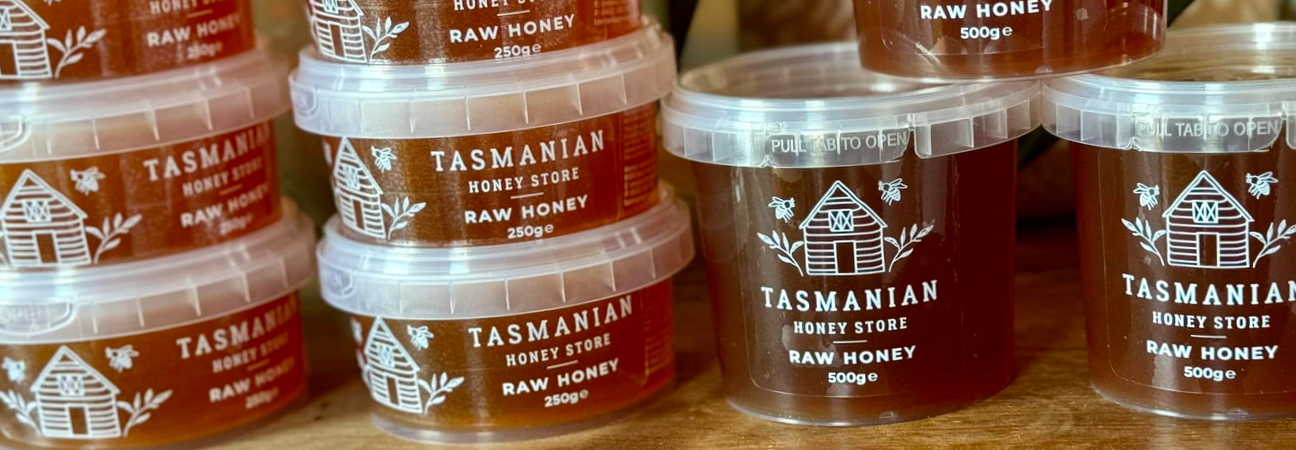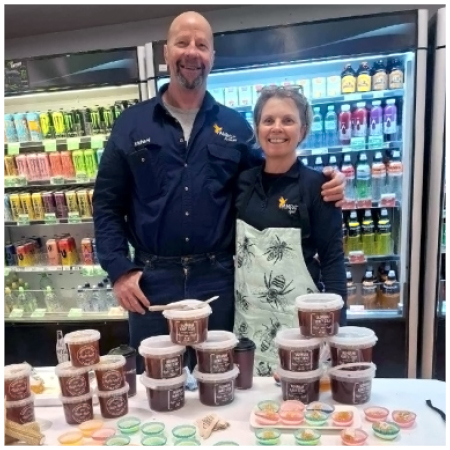Producer Profile: Meet Stacey, from Tasmanian Honey Store

Recently we rang Stacey Rocca, one of our favourite honey suppliers, to check how she and husband Mick fared with the fires on the West Coast. We ended up having a great chat about queen bees, Kunzia honey and the value of not putting all your (bee) eggs in one basket. Read on to find out more.
Stacey’s energy is tangible as she chats on the phone whilst making beds in her short-stay accommodation business. She’s clearly a multi-tasker used to having a lot of balls in the air.
Stacey and her husband Mick moved to North West Tasmania in 2015 from Western Australia and purchased a 60-acre farm where they have developed farm stay accommodation, Robin Hoods Well Farm Stay, as well as a quarter horse stud, Anroc Farms, and a thriving honey business, the Tasmanian Honey Store.
The honey side of the business grew organically after the couple found two old hives under a greengage tree on the farm when they first moved there. Mick had dabbled in beekeeping previously in WA, and his interest was rekindled. He bought a few more hives, some equipment, put out a call for anyone needing swarms relocated, and, well, one thing led to another: Mick and Stacey now have a 400-hive apiary producing raw, unprocessed honey and breeding their own queen bees. Mick does all the caring and nurturing of the bees, as well as handling and harvesting while Stacey is busy mainly with the horse stud and short-stay accommodation.

Stacey and Mick from Tasmanian Honey Store at our Producers Night in Longford
Mick and Stacey’s honey became a commercial concern a few years ago when they met our own CEO, Steve Longmore, whose daughter used to ride horses at Stacey’s stud. With one taste Steve was convinced that Mick and Stacey needed to get their product into Hill Street and gave them some advice on labelling and legal requirements.
Today Hill Street customers will be familiar with the large metal honey vats which allow you to refill your own honey jars. We also sell Tasmanian Honey Store honey in 500g and 1kg containers.
Their honey is raw, unprocessed and made by bees visiting 13 different flora, producing individual honeys of unique taste. Mick identifies places where there are unique flowers which he believes will create delicious honey. He’ll then visit the landowner, check the site, determine how many hives the flowers will support, and then put in up to 20-30 hives in any given location.
Examples of sites Mick has hives include lavender farms, fennel and buckwheat crops, leatherwood stands on the West Coast and in areas of native kunzea on the East Coast. Timing is everything as many of these flower in a very short window. For example, kunzea, which is endemic to north-east Tasmania, and a member of the Myrtle family, only flowers once a year. Mick needs to put his hives in ideally just at the point of blossoming to allow the bees the longest exposure to the kunzea flowers, which are out from September to early November. Fire or other weather events can shorten the flowering period.
Stacey and Mick do have hives on the west coast where the recent fires have affected leatherwood stands, however they were lucky – their hives are located east of Tullah and were largely unaffected. The leatherwoods are all but finished flowering by late February and Mick will bring the hives home in the next week or so. Stacey says that spreading their hives out over a number of sites protects them from catastrophes like fire.
Another venture Stacey and Mick have developed is breeding queen bees. They’re now the largest queen bee breeder in the state and are known for their docile and productive queens. Stacey says the process of breeding queens is quite fascinating: bee eggs are put into tiny cups and inserted into the frames facing the wrong way, which allows the bees in the hive to recognise that egg as different and to feed it royal jelly, which allows the juvenile bee to grown into a queen.
In the future Stacey and Mick plan to move on from their stud, farm and accommodation in order to give their honey business their full focus. Stacey has, through a scholarship from the Tasmanian Government granted during Covid, upskilled in social media and e-commerce and has been able to promote her honey to Tasmanian and interstate buyers, and wants to build on this. Given their honey is so special, we think Mick and Stacey have a very sweet future!
Tasmanian Honey Store honey is sold in most Hill Street stores statewide. Check with your local Hill Street store for availability.

